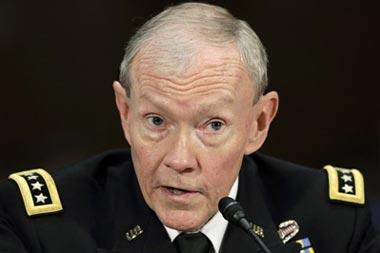U.S. and coalition troops will have to deal with the grim prospect of being attacked by rogue members of the Afghan security forces they mentor for the duration of the conflict, the Joint Chiefs Chairman said Wednesday.
"I can't prevent it," Army Gen. Martin Dempsey said of the insider attacks that have killed at least 53 allied troops, most of them American, this year and more than 110 since 2007.
"We can continue to work to mitigate that risk," Dempsey said during a question-and-answer session at the National Press Club. "We can lower the numbers, but I'd never stand here and say we can prevent it."
The reality is that training and advising the more than 330,000 soldiers and police in the Afghan National Security Forces is the linchpin in the allies' overall strategy for withdrawing all combat forces in 2014 and turning over security responsibilities to the Afghans, Dempsey said.
To achieve that end, U.S. and allied troops can't afford to be "commuters" in the war -- retreating to fortified compounds to avoid contact with the Afghans, Dempsey said. "You can't commute to work to train and advise."
The troops will have to deal with a "security paradox," he said.
U.S. troops now carry loaded weapons at all times in the presence of Afghans and some units have set up "red lines" on bases to separate themselves from Afghan troops, but Dempsey said that "one way of mitigating the risk is by getting closer to them (the Afghans)."
Dempsey's comments meshed with the message delivered Wednesday by Defense Secretary Leon Panetta to NATO ministers in Brussels on insider attacks and the general strategy -- and funding -- for withdrawing allied combat forces in 2014 and leaving behind a residual force of special operators to prop up the Kabul government and Afghan National Security Forces.
Following the withdrawal of the last of the 33,000 U.S. surge forces in September, the U.S. has about 68,000 troops in Afghanistan, bolstered by about 22,000 coalition troops -- 9,000 of them British. Several allies, including New Zealand and France, have announced plans to pull out most of their contingents in 2013, and Panetta and NATO Secretary General Anders Fogh Rasmussen were seeking to avoid what both have called a "rush to the exits."
Rasmussen acknowledged that many of the 28 NATO member states, squeezed by the economic crisis in Europe, will have difficulty meeting their commitments for continued funding of the Afghan war as well as their obligations to NATO.
"Once our economies recover, we must increase our investment in defense once again," Rasmussen said at the start of the ministers' meeting on Tuesday. "Because security is the basis of prosperity. Some argue that we cannot afford it. But I say that we cannot afford to be without it."
Panetta outlined a plan for easing the risk devised by Marine Gen. John Allen, the outgoing commander of the International Security Assistance Force, that appeared to put renewed emphasis on a patchwork of remedies NATO has already attempted.
"Insider attacks are a tragic part of every war," Panetta said, but "in this war, they are occurring with greater frequency than in the past."
The plan includes closer vetting of Afghan recruits, increased "cultural awareness" training for coalition troops on Afghan traditions, and "constant emphasis" on the employment of designated "guardian angels" in the ranks of allied troops to stay on guard in the presence of Afghans.
"I believe that we can and will counter this threat with these efforts," Panetta said. "Still deeper partnerships, still deeper integration -- those are the responses that will frustrate the enemy's designs to capitalize on this problem."
Rasmussen and Panetta also introduced the new command team that will oversee the response to insider attacks and the transition of the lead combat role to ANSF.
Allen will leave ISAF early next year to replace the retiring Adm. James Stavridis as supreme commander of NATO, working out of alliance headquarters in Brussels. Allen will be succeeded by Marine Gen. Joseph Dunford, now the assistant commandant of the Marine Corps. Both appointments require the approval of the Senate, which is not likely until January at the earliest.
Allen and Dunford, both veterans of the Iraq war, are alike in that neither had any experience in Afghanistan before taking on the top job as ISAF commander. Dunford attracted the attention of President Obama when he quickly voiced approval for Obama's announcement in 2011 of the plan to pull out combat forces in 2014.
Dunford, a native of Boston, acquired the nickname "Fighting Joe" as leader of Regimental Combat Team 5 under Gen. James Mattis in the 2003 drive on Baghdad.
Panetta and Rasmussen said ISAF plans for a residual force to remain in Afghanistan for 2015 and beyond had yet to be worked out, but the U.S. was already laying the groundwork.
Army Maj. Gen. Tony Thomas has taken command of the newly formed Special Operations Joint Task Forces Afghanistan (SOJTF-A), which seeks to combine special operators from the 23 NATO countries with forces in Afghanistan and which could serve as a model for a post-2015 residual force.
About 25 percent of the insider attacks have been carried out by Taliban double agents or sympathizers who have infiltrated the ANSF ranks, according to ISAF estimates, and Dempsey said at the Press Club that the infiltration was part of the enemy plan to thwart the U.S. transition strategy.
"The Taliban gets what we're doing," Dempsey said, "so they target it. We can't let that threat discourage or dissuade us."
"This is not jeopardizing our objectives, just making it a little tougher," Dempsey said. "The bond between our forces and the Afghan forces will be ultimately what gets [the Taliban] defeated."



























